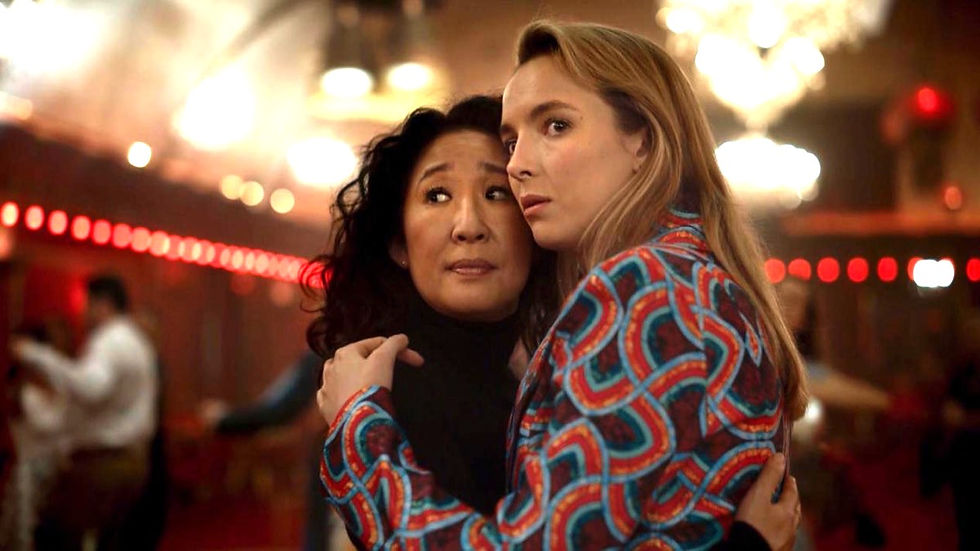WHAT'S KILLING EVE?
- Tahnee

- Jul 15, 2020
- 8 min read
The razor sharp fantasy has lost its edge. Spoilers ahead!

Phoebe Waller-Bridge has given us so much. Hot priests and chic jumpsuits, a new James Bond film, a Star Wars lady droid, the resurgence of guinea pigs and another reason to love Merritt Wever (like we needed more). When I think of what Santa Claus actually looks like, I see Phoebe’s face beaming down at me with an eyebrow slightly raised, in a tasteful beret. Her talent knows no bounds. We owe her. Among her most delightful contributions to mankind, Waller-Bridge gave us Killing Eve, a BBC/AMC series adapted from the Luke Jennings books starring the great Sandra Oh and the riveting Jodie Comer. It seemed a natural step that the creator of shows like Crashing and Fleabag would adapt a murderous thriller about an MI-6 operative and her obsession with a flamboyant female assassin. The common thread that Waller-Bridge weaves through her projects is a stylish and edgy humor that leaves room for pathos and cynicism. In my brain, to jump from a recovering sex addict who falls in love with a priest to a British intelligence officer smitten by a pyschopathic serial killer is completely logical.
Killing Eve started as a story about a woman who saw her own repressed darkness mirrored by a woman who wasn’t afraid to flaunt it. Villanelle represented an uninhibited life that intoxicated Eve and forced her to look inward at her desires, and outward at what she’d manifested for herself by not acting on those desires. On the surface, Eve was successful - married to a loving man, gainfully employed and quite good at her job. But Villanelle throws a wrench in her worldview, prompting a game of cat and mouse spurred by impulse, envy, and rage.
Waller-Bridge sat at the helm of season one, and imbued the show with her signature idiosyncrasies and a flare for black comedy that made a story about a cold-blooded killer absurdly warm. Throughout the glorious first season, Villanelle is doled out in small, but calculated doses. We’re trained from the very beginning to be cautious when she’s onscreen; she’s an untrustworthy psychopath and to be alone with her means you’ll likely be dead by the end of the scene. She’s exhilarating to behold (Jodie Comer is an absolute marvel in the role), but her presence also makes for an extremely stressful watching experience. In the second episode of the first season, Villanelle has a psych evaluation to ensure she’s still mentally capable of killing people without remorse. The therapist shows her a photo of a man hanging from a noose and asks her what she sees, to which she responds, “Good legs.” He then shows her a dead dog hanging from a noose, and she feigns horror before bursting into a fit of giggles. It’s with these moments we’re meant to understand that Villanelle is not only the antithesis of Eve Polastri, but a true lunatic at her core.
It’s questionable then, that the show decided to lean into the origins of Villanelle’s pathology in season three, a pathology we were meant to take as innate. What’s equally questionable is the inclination to delve into the romantic tension between Eve and Villanelle. Rather than continuing to explore and focus on what inherent qualities make Eve and Villanelle reflective of each other, Killing Eve opted to highlight their chemical attraction instead. Waller-Bridge handed the reins over to Emerald Fennell for season two, beginning a tradition of starting each season with a new female showrunner, and although the second season was entertaining, the void left by Waller-Bridge was deeply felt. Season two’s finale in which (spoiler alert) Villanelle shoots Eve and leaves her for dead in an empty Roman ruin left audiences with more questions than answers, and suddenly the prospect of a third season became titillating rather than overkill. Among these questions was, what now? What are we to make of Eve as the victim of a bullet intended to kill? Where did Villanelle go? We know they’ll find their way back to each other, but how?
The latest season finds Eve and her lover/enemy Villanelle in largely different places in life, physically and emotionally. Whereas season two began seconds after Eve unsuccessfully stabs Villanelle in the season one closer, season three starts many months after Villanelle’s attempt to end Eve’s life, and the show’s energy suffers for it. Killing Eve operates at its highest level when the ladies are laser-focused on each other’s whereabouts, and to the contrary, Villanelle believes Eve to be dead (although sometimes it’s hard to imagine that a trained assassin couldn't kill her target at point blank range. I often wonder if Villanelle aimed to only wound and not kill on purpose). Eve, of course, is alive, but picking up the pieces of her shattered life laid broken by the consequences of hitching her wagon to Villanelle, so to speak. Her husband Niko wants nothing to do with her and is presumably in some sort of psych ward, she’s left MI-6 and has taken a job in a dank restaurant kitchen assembling dumplings, and she’s living alone in a tiny apartment littered with junk food and empty wine bottles. Eve has vowed not to return to her life as an intelligence officer, a life made thrilling by proximity to Villanelle, but by the end of the first episode, our beloved Kenny is found dead, giving us a) a solid whodunnit plot line to follow for the remainder of the season and b) a catalyst for Eve to get reeled back into detective work and Carolyn to have an emotional reset of epic proportions.
As devastating as it is that Kenny is now gone, his death signaled a return to the “kill your darlings” approach that permeated the first season. Who among us could forget Villanelle stabbing Eve’s best friend Bill to death in the middle of the dance floor at a nightclub? The risky choice to kill Kenny (get your South Park jokes out now) in the first episode gave me hope for a daring new season, but alas, this was the only definitive, story-pushing choice made throughout the season’s eight episodes. After Kenny’s death comes a carousel of meaningless ones, and far too many near-deaths as well. Niko survives an attack that by all accounts should have killed him, and in the finale, Konstantin is spared by Carolyn because….she loves him? The convictions that characterized Killing Eve’s first two seasons have seemingly fallen away in this latest season, and it’s hard to deduce that this murkiness is indicative of a weaker writing team or a reflection of Villanelle’s newfound empathy, which goes against everything we know about her.
Initially, I surmised that season three was not working because the dissemination of Villanelle was all wrong. I thought the problem was that the show refused to use her in small doses like it once did in season one, so the audience could have a slow and steady drip rather than a rush of pure cortisol. I realized after finishing the season that it’s not that we need Villanelle in small doses, it’s that we need her in equal doses to Eve, which season three did not allow for given the time spent on fleshing out Villanelle’s backstory. An entire episode is dedicated to Villanelle finding her biological family in rural Russia in an attempt to find some sort of community and confront her mother about her childhood memories. It’s an interesting and understandable decision to give viewers an explanation as to how and why Villanelle came to be who she is, but the episode is both revealing and shrouding. Villanelle apparently had a father who died when she was young, and a mother who swiftly placed her in an orphanage after his passing because she “had a darkness.” This tracks with the Villanelle of season one, but what of season three Villanelle, who is grappling with her life choices and pondering her purpose? Who is now showing empathy and remorse, and who flip flops between wanting to become a handler and wanting to quit her job entirely? The episode, “Are You From Pinner?” is meant to illuminate the roots of Villanelle’s complexities and past traumas but only offers more witnesses to her psychopathy (Villanelle herself has admitted to being a psychopath. “You should never call a psychopath a psychopath. It upsets them," she tells Eve in season one). Even before she became a hired assassin, she burned down the orphanage where she dwelled. Is that the mark of a psychopath or a troubled kid who’s hurting? It’s difficult to trust that Villanelle is genuinely yearning for a new life, but it’s equally hard to trust her mother. Is her mother able to identify Villanelle’s darkness because she has “the darkness” as well or is she telling the truth about fearing her own daughter? The answers laid out in “Are You From Pinner” feel rather half-baked for such explorable terrain. The scope of the story has begun to outweigh the peculiar charms Waller-Bridge infused from the beginning.
While Villanelle gets the opportunity for growth and motivation in every episode, Eve, on the other hand, remains in a frenzied purgatory for almost the entire season. She’s essentially a proxy for viewers who can’t keep up with the tedious and convoluted work of solving Kenny’s death (turns out we had a surveillance camera all along! lol) and bringing The Twelve to justice. Even moments that resemble growth on Eve’s part prove to be nothing more than circling the drain of her true nature. After a talk with Bitter Pill’s Jamie (the addition of the Bitter Pill office and its employees isn’t my favorite), Eve decides to visit Niko in Poland rather than continue to prioritize working like she did in the past, only to witness Niko being stabbed in the neck with a pitchfork. When Niko forsakes her for good, she not only goes back to work, but returns to pining for Villanelle and digging up dirt on The Twelve. Eve teeters between inaction and evolution. One could argue that Eve staying incognito, making dumplings and boozing it up at home, rather than forcing her old life back into place is growth. She’s ostensibly keeping her loved ones safer by staying out of the fold, but Eve has lived her life that way before meeting Villanelle and found herself wanting more. Turns out she’s back to wanting more after all this time.
Perhaps it was inevitable that Killing Eve would shift its focus from Eve to Villanelle at some point. It’s human nature to therapize, rationalize, or pathologize people we don’t understand, and Villanelle has always been a flashy puzzle. Studying the fucked up origins of a life gone awry both repulses and endears us, but it also undercuts what we love about Villanelle. The seduction of Villanelle is the fantasy she embodies for a woman like Eve. It’s no coincidence that Eve shares a name with the biblical figure who committed a sin of desire. To act out in rage without consequences, to be endlessly gluttonous and excruciatingly luxe, to be candid, sadistic and strong in the face of fear is a pipe dream most women don’t get to live out. Villanelle was scary because her very presence subverted every expectation, but she’s also alluring because of it. What is Villanelle if not scary? What is the proverbial snake offering forbidden fruit if not frightening? Now that she’s recognizing her limits, so is the series.
Season three somehow manages to be both tidy and messy all at once, as most love stories are. But I’m left wondering if this really is a love story or a story of self-discovery. We’re long past foreplay, so what’s next? Is this a story about a serial killer who finds her humanity or a love story between an intelligence officer and her greatest foe? If the answer is both, I worry we’ll lose sight of the make-believe that brought us such a sublime story in the first place. Only time will tell.



Comments